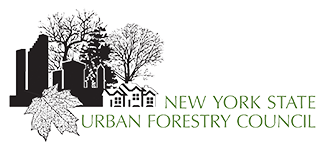
Some of the 2017 Young Urban Forester Interns, with program coordinator Ashleigh Pettus at far left.
Ashleigh Pettus is the Operations Manager & Environmental Educator for Trees New York. She coordinates the organization’s summer Young Urban Forester Internship, which began in 2008.
Can you tell us about your educational background and how you came to Trees New York?
Ashleigh Pettus: I graduated from Lehman College in 2016 with a BA in History and Minor in Childhood Education. I spent my winter and spring breaks volunteering; one of my most memorable spring breaks is when we traveled to Perryville, Arkansas to spend a week at Heifer International. There, I learned about rural farming and sustainability; I loved it so much, I went back and spent three months there.
When I came back to NYC, I wanted to share my knowledge but it had to be adapted to an urban setting. I found Just Food and taught some of their Farm School NYC classes. Soon after that I worked at Wave Hill in the Bronx, where I started to learn tree identification, fell in love with trees, and realized I wanted to focus my energy there. I was fortunate to be hired by Trees New York in the summer of 2015 to be an environmental educator. Eventually I became the Young Urban Forester Internship program coordinator as well. It’s a pleasure to share the things I’ve learned in this environmental field with my summer interns.
Please tell us about the internship.
AP: Trees New York’s Young Urban Forester Internship is a seven-week, 175-hour urban and community forestry paid experience. The goal of the annual summer program is to introduce up to 16 high school juniors and seniors from low-income households in New York City to careers in the fast-growing field of environmental science and in urban forestry specifically.
The interns acquire specific occupational skills and broader employment skills such as communication, teamwork, and problem-solving in a way that is not typically possible in the classroom. The interns make a visible and lasting impact in their communities. On average, the interns care for 600 street trees, transforming their neighborhoods as they develop the skills and commitment necessary to serve as effective stewards of the urban forest long after the program ends. They also make long-lasting friendships!
The comprehensive curriculum includes urban forest conservation, restoration and planning, air and water quality, invasive species, introduction to GIS and map making, soil science and tree care, biology, identification, and pruning.
Interns are encouraged to apply to college, learn how to navigate the application and selection process, and receive assistance with their application essay. As part of the internship, students research an environmental topic of their choosing and present their findings. Some of the recent topics interns investigated:
NYC Economy and the Environment
Green Infrastructure of NYC
Water Pollution in NYC
Urban Farming in NYC
Invasive Species in NYC
Air Pollution in NYC
Newtown Creek – Superfund Sites
The presentation prepares students for college level research and the lessons on public speaking help them both professionally and academically.
We partner with other programs; for instance, this summer we worked with the Gowanus Canal Conservancy Youth Green Team. Gowanus Green Team is a summer job training program for high school students focused on environmental issues in the Gowanus Watershed. That day we teamed up to learn about the Gowanus Watershed and had a work day in their plant nursery.
The Young Urban Forester Interns become Citizen Pruners, another program of Trees New York. They are trained, take the test, and receive a license. Until they’re 18, they can only prune with someone who is 18 years or older. Once they turn 18, they can prune on their own. We spent much of this year’s internship in Greenpoint, Brooklyn, pruning trees and doing other forms of tree stewardship.
At the end of the program we make sure to keep in contact with the interns, providing extra opportunities to work with Trees New York throughout the year. I strive to hire an intern from the previous year to be the next year’s Team Lead. They already know the ropes and it’s nice for new interns to have a younger person to talk with if they don’t feel comfortable talking to an older supervisor.
Any anecdote you could share?
AP: The thing that happens every year is that when they learn to ID the 17 most common New York City tree species, the interns get obsessed with identifying trees out loud. They tell me they actually start to annoy their families because this newly acquired knowledge is … hard to keep in. That makes me smile.

